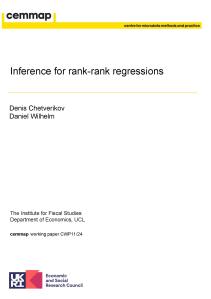We study testable implications of multiple equilibria in discrete games with incomplete information. Unlike de Paula and Tang (2012), we allow the players’ private signals to be correlated. In static games, we leverage independence of private types across games whose equilibrium selection is correlated. In dynamic games with serially correlated discrete unobserved heterogeneity, our testable implication builds on the fact that the distribution of a sequence of choices and states are mixtures over equilibria and unobserved heterogeneity. The number of mixture components is a known function of the length of the sequence as well as the cardinality of equilibria and unobserved heterogeneity support. In both static and dynamic cases, these testable implications are implementable using existing statistical tools.
Authors

Research Fellow University College London
Áureo is an applied econometrician with strong interests in both methodological and empirical questions, affiliated with UCL, Cemmap, IFS and CEPR.

Xun Tang
Working Paper details
- DOI
- 10.47004/wp.cem.2020.5620
- Publisher
- The IFS
Suggested citation
Related documents
More from IFS
Understand this issue

Gender norms, violence and adolescent girls’ trajectories: Evidence from India
24 October 2022

What are the challenges in getting debt on a falling path?
28 June 2024

Election Special: Your questions answered
27 June 2024
Policy analysis

IFS Deputy Director Carl Emmerson appointed to the UK Statistics Authority Methodological Assurance Review Panel
14 April 2023

ABC of SV: Limited Information Likelihood Inference in Stochastic Volatility Jump-Diffusion Models
We develop novel methods for estimation and filtering of continuous-time models with stochastic volatility and jumps using so-called Approximate Bayesian Compu- tation which build likelihoods based on limited information.
12 August 2014

Is there really an NHS productivity crisis?
17 November 2023
Academic research

Inference for rank-rank regressions
28 May 2024

Sample composition and representativeness on Understanding Society
2 February 2024

The impact of labour demand shocks when occupational labour supplies are heterogeneous
28 June 2024